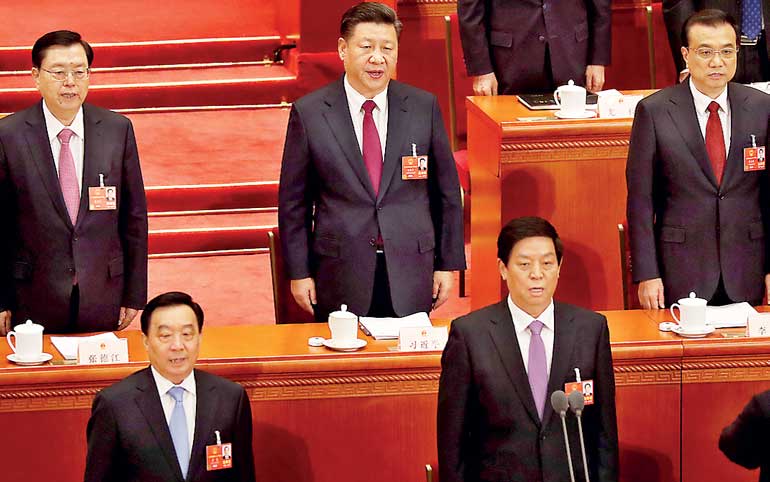Thursday Feb 19, 2026
Thursday Feb 19, 2026
Tuesday, 6 March 2018 00:00 - - {{hitsCtrl.values.hits}}
 Chinese President Xi Jinping, Chinese Premier Li Keqiang and other senior officials sing the national anthem during the opening session of the National People’s Congress (NPC) at the Great Hall of the People in Beijing, China, 5 March. REUTERS
Chinese President Xi Jinping, Chinese Premier Li Keqiang and other senior officials sing the national anthem during the opening session of the National People’s Congress (NPC) at the Great Hall of the People in Beijing, China, 5 March. REUTERS
Beijing (Reuters): China unveiled its largest rise in defence spending in three years yesterday (5 March), setting a target of 8.1% growth for this year, fuelling an ambitious military modernisation program and making its neighbours nervous.
The 2018 defence budget will be 1.11 trillion yuan ($175 billion), according to a report issued at the opening of China’s annual meeting of parliament.
The defence spending figure is closely watched around the world for clues to China’s strategic intentions as it develops new military capabilities, including stealth fighters, aircraft carriers and anti-satellite missiles.
China will “advance all aspects of military training and war preparedness, and firmly and resolvedly safeguard national sovereignty, security, and development interests,” Premier Li Keqiang told the opening session in an address.
“Faced with profound changes in the national security environment, the absolute leadership of the military by the ruling Communist Party must be observed, and the unity between the government and the military, and the people and the military, must always be ‘strong as stone’”, he said.
Li also said China had basically completed efforts to cut back the size of its armed forces by 300,000, a move President Xi Jinping announced in 2015 to improve efficiency that had caused unease in the ranks.
China’s military build-up has rattled the nerves of its neighbours, particularly because of its increasingly assertive stance in territorial disputes in the East and South China Seas and over Taiwan, a self-ruled territory Beijing claims as its own.
“We would like to see China be more transparent about its defence policy, including spending and the direction of its military power,” Japanese Chief Cabinet Secretary Yoshihide Suga told a regular briefing.
Taiwan’s China policy-making Mainland Affairs Council said China’s moves to raise defence spending and military drills have increased tension.
“China should take international concerns seriously, increase its defence budget’s transparency and give up its targeted military deployment towards Taiwan in order to avoid an escalation of regional tension,” it said.
The 2018 defence spending increase comes as China’s economic growth expanded 6.9% last year, the first acceleration in annual growth since 2010. But China kept its 2018 economic growth target at around 6.5%, said Li, the same as in 2017, despite exceeding that year’s target.
Last year, defence spending was set to increase just 7%, to 1.044 trillion yuan ($164.60 billion), or about one-quarter of the proposed U.S. defence spending for the year. In 2016, it grew 7.6%.